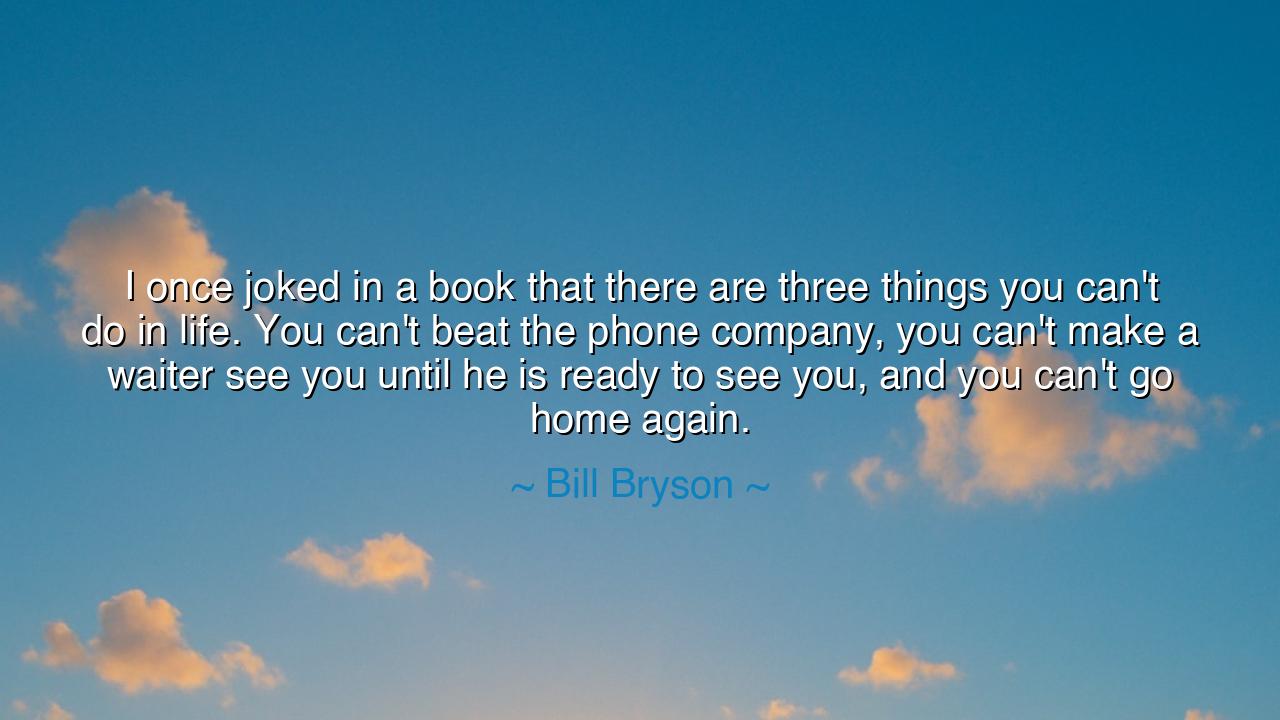
I once joked in a book that there are three things you can't do
I once joked in a book that there are three things you can't do in life. You can't beat the phone company, you can't make a waiter see you until he is ready to see you, and you can't go home again.






In the wry and reflective words of Bill Bryson, traveler, humorist, and chronicler of the human condition, we find a truth wrapped in jest: “I once joked in a book that there are three things you can’t do in life. You can’t beat the phone company, you can’t make a waiter see you until he is ready to see you, and you can’t go home again.” Though his tone is light, beneath the laughter runs a river of quiet wisdom. Bryson’s humor conceals what the ancients would call a truth of mortality and change—that life’s struggle is not merely against systems or frustrations, but against time itself, the inexorable current that carries us forward, never backward.
The first two of Bryson’s impossibilities—the phone company and the waiter—speak to the eternal battle between individual will and the machinery of the world. They are symbols of modern life’s absurdity: the helplessness of man before institutions too vast to reason with, and the small indignities that test our patience in daily living. The phone company stands for the faceless systems that bind us, the bureaucracy that neither loves nor hates, but simply exists—immovable and indifferent. The waiter, by contrast, represents the subtler trials of human pride, the sting of being unseen, unheard, or unimportant. In both, Bryson shows us how even the simplest encounters reveal the limits of control that every person must accept.
But it is the third impossibility—“you can’t go home again”—that gives the quote its immortal heart. For in those few words lies one of life’s most poignant truths: that home, the place we long for, exists only in memory. To “go home” is to attempt to return not to a place, but to a time—to the innocence, the warmth, the belonging that once was. Yet the past, like water poured upon sand, cannot be gathered again. When we return to the houses of our youth, the rooms feel smaller, the air thinner, the laughter quieter than we remembered. The faces may still be there, but they are older—or they are gone. Home changes because we change. The soul that leaves can never be the same as the one that returns.
Many before Bryson have felt this sorrow. Odysseus, the wandering king, spent ten years seeking his home in Ithaca, only to find that the island he returned to was not the one he left. His kingdom had aged, his wife had endured, and his son had become a man. Though he triumphed in his journey, he could not reclaim the world of his youth. In this, Odysseus is the eternal traveler—the one who learns that the true voyage is not across the sea, but through the heart. Bryson, in his modern wit, speaks the same truth that Homer sang in epic verse: that nostalgia is both a treasure and a trap, a longing for what cannot be restored.
The origin of Bryson’s reflection lies in his lifelong dance between continents and cultures. Born in America but long a resident of England, he moved between worlds, never fully belonging to either. His writings—part humor, part elegy—often dwell on the beauty and absurdity of homecoming. To leave one’s homeland is to dream of it endlessly; to return is to realize that the dream has changed shape. Through laughter, he teaches the melancholy wisdom that the ancients knew: that time transforms all, and that to live is to let go.
What, then, is the lesson of this quote? It is not despair, but acceptance. Bryson’s humor reminds us that life’s frustrations and losses are universal and unavoidable. We cannot master the world’s systems; we cannot control others’ attention; and we cannot reclaim the past. But in recognizing these limits, we find freedom. The wise man does not rage against the unchangeable—he learns to laugh, to adapt, to cherish what remains. For though we cannot go home again, we can build new homes within the present moment—places of peace, memory, and gratitude.
So, children of the future, when you find yourself exasperated by life’s small cruelties or haunted by the ghosts of what once was, remember Bryson’s humor as wisdom disguised in jest. Laugh at the absurdities you cannot conquer. Love the memories that cannot return. And most of all, make peace with the passage of time. For the world will not bend to your will—but if you live with awareness, with humility, and with humor, you will find that every step forward becomes its own kind of homecoming, and every loss becomes the teacher that leads you back to yourself.






AAdministratorAdministrator
Welcome, honored guests. Please leave a comment, we will respond soon